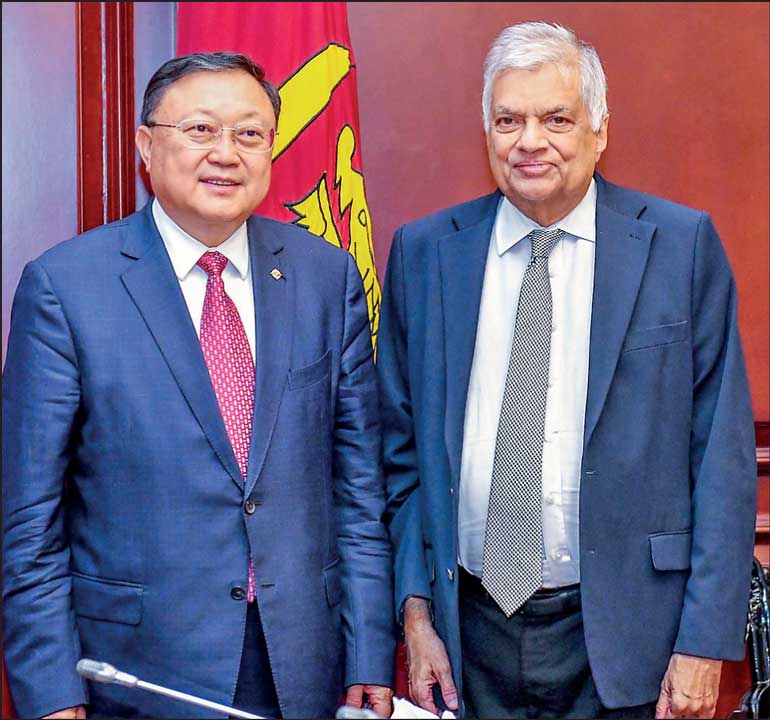Saturday Feb 14, 2026
Saturday Feb 14, 2026
Friday, 22 March 2024 00:22 - - {{hitsCtrl.values.hits}}

President Wickremesinghe with China Communications Construction Company (CCCC) Chairman Wang Tongzhou. CCCC through CHEC Port City Colombo, has invested $ 1.4 billion on Port City Colombo and committed a further $ 300 million. FDI and exports are key to Sri Lanka’s economic recovery
 Sri Lanka is now clearly emerging from an unprecedented economic crisis that imposed significant hardships on its people, especially the most vulnerable. There are now some clear signs of recovery. The IMF has projected that the economy will expand in 2024 and that growth will accelerate. Tight borrowing conditions and reduced disposable income still holds back domestic consumption whilst the reform momentum is hurting the poor in some ways.
Sri Lanka is now clearly emerging from an unprecedented economic crisis that imposed significant hardships on its people, especially the most vulnerable. There are now some clear signs of recovery. The IMF has projected that the economy will expand in 2024 and that growth will accelerate. Tight borrowing conditions and reduced disposable income still holds back domestic consumption whilst the reform momentum is hurting the poor in some ways.
Sri Lanka’s best hope for recovering from one of its most severe economic crises is to cut back on cost, smart size the bureaucracy and the military, restructure the debt and improve the business environment to attract new business and trade and for re-investment from existing investors.
Sri Lanka
The President certainly faces formidable challenges in this regard. He has so far faced up to the economic challenges admirably. His efforts are now subject to an international case study. The country’s economy, which shrank by over 7% last year is set to recover in 24, the absence of shortages and queues is a huge plus, though it is largely not due to the economy picking up but because people have less money to spend and price levels are still elevated. With inflation in the past year having halved the real income of people by an outrageously high interest policy that has sunk the SMEs and tourism sector and high taxation of those in the tax net further impoverishing those in the middle income and professional categories.
The exodus of these professionals and others from the country is leaving behind gaping holes in several important sectors in the economy. The Government must get the professional class and business class who are not in the tax net to pay something from now on. If the IRD can’t, get the private sector to do it collaboratively. Also work with the private sector on a talent retention and development program to retain talent in the country.
Revenue management
The tax reforms that have impacted the middle and professional classes directly and the increased indirect taxes impacting the vulnerable and the poor, are still not covering the gaping hole in the country’s finances that need to be filled for IMF support to continue into the future. Government revenue has seen a shortfall when compared to the revenue target agreed with the IMF. There is pressure to look at several other areas to increase revenue and manage costs.
Economic growth
The country requires rapid economic growth to make a full recovery. The IMF in all probability understands this challenge but seems to be insensitive to the issue. Sri Lanka is not a dictatorship to introduce draconian tax laws to meet revenue targets or to drive reforms. The opposition is capitalising not knowing the consequences of doing so. There certainly are several other ways to increase tax revenue and cut Government expenditure. It is expected that debt restructuring will lower Sri Lanka’s gross financing needs over the medium term and long term, in line with the targets under the IMF’s Extended Fund Facility, and support an improvement in the country’s debt metrics over the next five years.
Local-currency restructuring could accelerate progress towards the restructuring of external debt and bring borrowing rates down. Whilst stronger revenue generation is key to the IMF program implementation, fiscal measures in particular, will be central to achieving debt sustainability and economic recovery. The risks still remain significant and elevated, as a record of weak revenue generation presents challenges to achieving a faster reduction in the budget deficit and the general Government debt-to-GDP ratio. There is certainly light at the end of the tunnel if Sri Lanka continues with the reform agenda. However reforms merit debt relief and access to low cost funding.
References:
https://www.dailynews.lk/2024/03/01/business/424502/china-harbour-corp-to-reinvest-usd-300-mn/
https://www.imf.org/en/News/Articles/ 2024/03/01/022224oped-srilanka-economic-reform-program-is-starting-to-work
US diplomat Donald Lu: Sri Lanka is a “great comeback story”